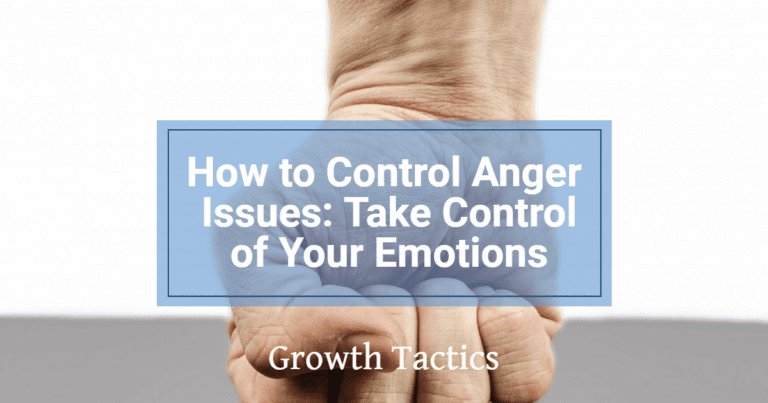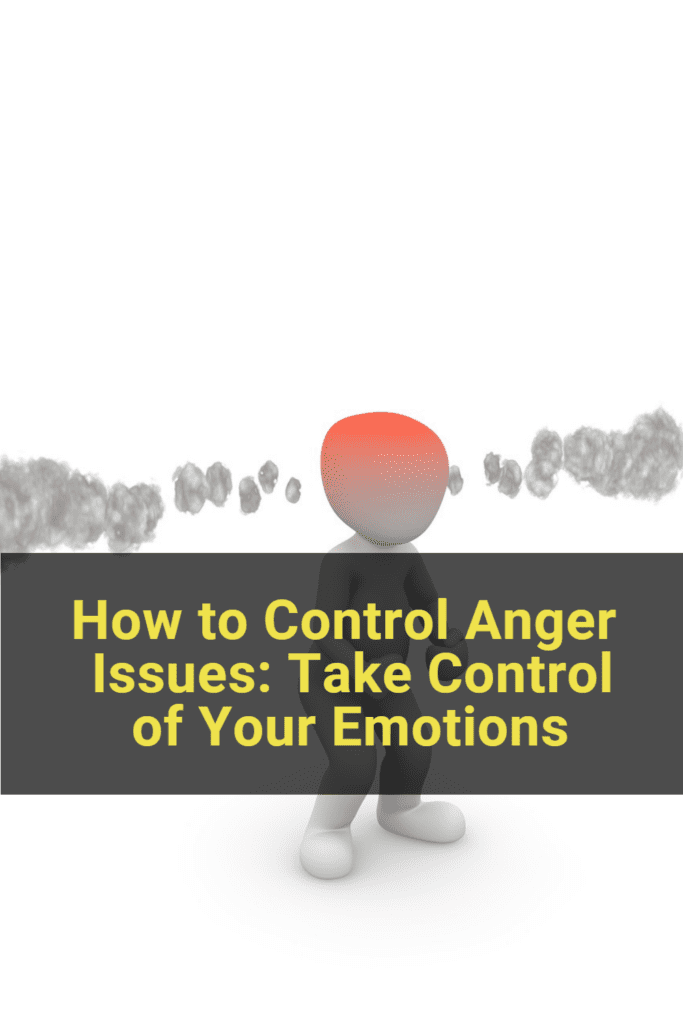Are you struggling with anger issues and finding it hard to keep your cool in challenging situations? Don’t worry, you’re not alone. Many people face anger management challenges, and the good news is that there are ways to tackle this issue head-on. In this article, I’ll share some valuable tips and strategies on how to control anger issues and improve your overall well-being. So, stick around because this article is definitely worth a read!
Jump To Section
Understanding Anger Management
Let’s start by understanding what exactly we mean by “anger management.” It’s the process of learning how to control our anger before it controls us. Anger is a normal and natural emotion, but when it becomes uncontrollable and starts negatively impacting our relationships and mental health, that’s when anger management comes into play.
Why is Anger Management Important?
You might wonder why it’s so crucial to manage anger. Well, uncontrolled anger can take a toll on both our physical and emotional well-being. It can lead to strained relationships, increased stress, and even aggressive behavior. By learning how to control our anger, we can reduce the risk of falling into a harmful spiral and nurture healthier relationships with those around us.
Strategies for Controlling Anger

Dealing with anger can sometimes feel like a rollercoaster ride, but don’t worry, I’ve got your back! In this blog section, I’ll share some powerful strategies to help you take control of your anger and keep those fiery emotions at bay. So, let’s dive right in!
Deep Breaths and Counting: Instant Calmness
When anger starts bubbling up within you, take a moment to pause and take a deep breath. Inhale slowly, filling your lungs, and then exhale gently, letting go of that anger. Deep breathing immediately calms your nervous system and helps diffuse the intensity of your emotions. But that’s not all – here’s where the magic starts! While you breathe, count slowly to 10. This simple technique gives you valuable time to rationalize your emotions and prevents anger from spiraling out of control.
Unleash Your Anger in Healthy Ways
Bottling up your anger is never a good idea. So, what can you do instead? Find healthy outlets to express your anger. Talk to a trusted friend or family member about what’s bothering you. Venting can release some of that pent-up frustration and give you a fresh perspective. Another option is to pour your emotions onto paper. Journaling allows you to acknowledge your anger and explore the underlying causes.
If you prefer a more physical release, engage in activities like hitting a punching bag or going for a run. These actions enable you to channel your anger into something productive, while also boosting your mood through exercise. Remember, finding healthy ways to express your anger is like giving it an escape route, helping you maintain balance and prevent explosions.
Humor: The Secret Weapon

Humor can be a powerful ally when it comes to defusing anger. Next time you find yourself in a heated situation, try injecting a little bit of humor. It might sound strange, but laughing at the absurdity of the moment can instantly diffuse tension and shift the energy. However, be mindful of the context and the people involved. Use humor wisely and with sensitivity to avoid unintentionally escalating the situation.
Seeking Professional Guidance
Sometimes, managing anger on your own can be a real challenge. And that’s perfectly okay! Seeking professional help is a wise choice. Licensed therapists with expertise in anger management can provide valuable insights, techniques, and personalized guidance tailored to your specific needs. They have the experience and the know-how to help you navigate your anger more effectively and foster long-term positive change.
Practice Mindfulness: Harnessing the Power of Presence
Mindfulness is a game-changer when it comes to anger management. By cultivating mindfulness, you can navigate the turbulent waters of anger with grace and composure. Take a few moments each day to engage in mindfulness exercises such as deep breathing, meditation, or simply grounding yourself in the present moment. With regular practice, you’ll become more self-aware of your emotions, allowing you to recognize anger’s early signs and prevent it from spiraling out of control.
Harness the Strength of Positive Self-Talk: Changing Your Inner Dialogue
The way we speak to ourselves has a significant impact on our emotions and actions. Embrace the power of positive self-talk to reframe your mindset and control anger effectively. When anger begins to bubble up, intentionally shift your self-talk to be more positive and rational. Remind yourself that anger won’t solve the problem and that you have the agency to choose a calm and constructive response. Repeat affirmations like “I am in control of my emotions” or “I can handle this situation calmly and effectively.” Empowerment starts from within!
Take a Timeout: Stepping Back to Regain Composure

Sometimes, the best approach when anger starts seeping in is to take a timeout. Temporarily remove yourself from the triggering environment, if feasible, and give yourself a few minutes to regain composure. Use this time to engage in activities that promote calmness, like taking a leisurely walk, listening to soothing music, or practicing deep breathing exercises. Stepping away briefly allows you to cool down, fostering a clearer mindset when you re-engage with the situation.
Embrace Empathy and Perspective-Taking: Understanding Others
Anger often stems from a sense of injustice or unfairness. Cultivating empathy and actively trying to see from others’ perspectives can help dissipate anger. Put yourself in their shoes, explore their motivations, and seek to understand their struggles. Remind yourself that reacting with kindness and understanding, even in challenging moments, can lead to more positive outcomes. Embrace the transformative power of empathy in managing your anger and fostering healthier relationships.
Develop Healthy Coping Mechanisms: Finding Balance and Release
Building healthy coping mechanisms is crucial in managing and expressing anger effectively. Discover activities that help you relax and alleviate stress. Explore options such as journaling, exercising, practicing yoga or mindfulness, or engaging in hobbies that bring you joy. By incorporating these healthy outlets into your daily routine, you provide yourself with productive ways to release anger before it builds up. Remember, nurturing your well-being is a key component of anger mastery.
Professional Help for Anger Management
Anger is a natural emotion, but when left unchecked, it can lead to damaging consequences. Thankfully, some professionals specialize in helping individuals like you manage anger effectively. In this section, we’ll explore the importance of seeking professional help for anger management and how it can support you in your journey toward a calmer and more peaceful life.
The Power of Seeking Professional Guidance
When it comes to managing anger, professional help can be a game-changer. Anger management therapists and counselors have the experience, expertise, and tools to assist you in understanding the underlying causes of your anger and developing healthy coping strategies. These professionals can provide a safe and non-judgmental space for you to explore your emotions and learn effective techniques for managing anger in various situations.
What to Expect from Anger Management Therapy
In anger management therapy, you’ll work closely with a trained professional who will guide you through a personalized treatment plan. The sessions may include:
1. Assessment and Evaluation: The therapist will conduct an initial assessment to better understand your unique anger triggers, patterns, and their impact on your life. This evaluation helps tailor the therapy to your specific needs.
2. Cognitive-Behavioral Techniques: Cognitive-behavioral therapy (CBT) is commonly used in anger management treatment. You’ll learn to identify and challenge negative thought patterns and replace them with healthier ways of thinking. This shift in mindset can greatly impact how you perceive and react to anger-inducing situations.
3. Skills Training: Anger management therapists will equip you with practical skills and strategies to effectively manage your anger. These techniques may include relaxation exercises, communication skills, problem-solving strategies, and assertiveness training. These tools will empower you to navigate anger triggers and conflicts with more confidence and composure.
4. Support and Accountability: Throughout your therapy journey, the anger management professional will provide continuous support and accountability. They will work with you to set achievable goals and track your progress. This ongoing guidance can help you stay motivated and committed to your anger management journey.
How to Find Professional Help
Finding the right anger management professional for you is essential. Here are a few steps you can take:
-
Seek Recommendations: Ask your primary care physician, friends, or family members for referrals. Personal recommendations can provide valuable insights into therapists who specialize in anger management.
-
Online Directories: Utilize online directories, such as Psychology Today, to search for anger management therapists in your area. These directories often provide detailed profiles, allowing you to find a professional who aligns with your needs and preferences.
-
Consultation Calls: Schedule consultation calls with potential therapists to discuss your concerns and treatment approach. This initial conversation can help you evaluate whether the therapist is the right fit for you.
Remember, seeking professional help is a courageous step towards transforming your relationship with anger. It’s a process that requires time, effort, and commitment. By engaging in anger management therapy, you’re investing in yourself and your well-being.
If you’re ready to explore professional help for anger management, don’t hesitate to reach out. With the guidance of a skilled and compassionate professional, you can gain the tools and insights necessary to lead a calmer, more fulfilling life.
Additional Resources:
- Psychology Today’s Directory of Anger Management Therapists
- Mayo Clinic: Anger Management
- National Institute of Mental Health: Anger
Remember, you’re not alone in this journey, and professional help is available at your fingertips. Take that important step towards a happier and calmer you. You’ve got this!
Healthy Ways to Deal with Anger

In addition to the strategies mentioned above, it’s important to develop healthy ways to deal with anger:
-
Practice Self-Care: Set aside time for activities you enjoy, such as exercise, hobbies, or relaxation techniques like meditation or taking a soothing bath. Prioritizing self-care helps reduce overall stress levels and keeps anger in check.
-
Identify Triggers: Pay attention to situations or experiences that trigger your anger. By recognizing your triggers, you can be better prepared to handle them and respond in a more controlled manner.
-
Learn Effective Communication: Improve your communication skills to express your needs and concerns assertively, rather than aggressively. Honest and open communication fosters understanding and reduces the likelihood of angry outbursts.
Recap of Key Anger Management Tips
So, whether you’re dealing with anger issues or simply looking for ways to control your emotions better, these tips will guide you on your journey toward managing anger effectively. Remember, you have the power to take control of your emotions and live a happier, more balanced life. Keep practicing these techniques, and you’ll see positive changes in no time!


